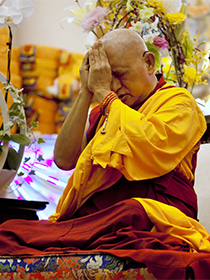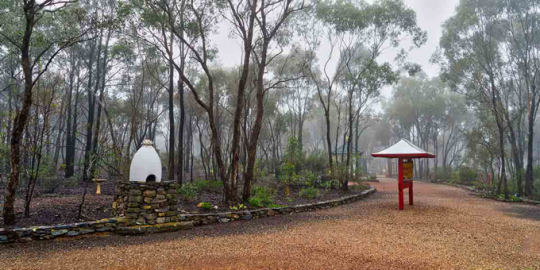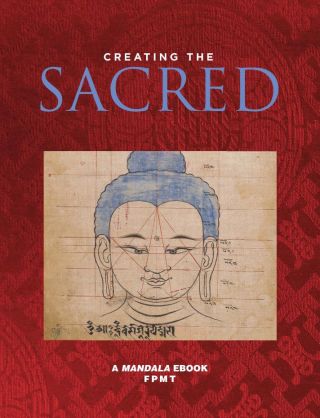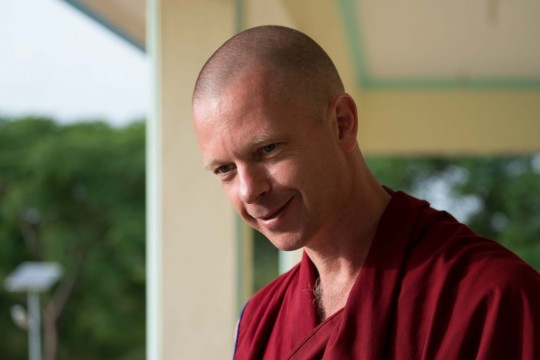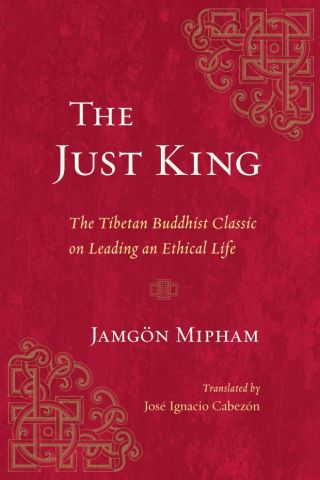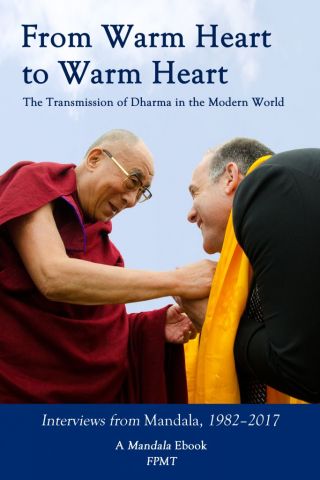- Home
- FPMT Homepage
Foundation for the Preservation of the Mahayana Tradition
The FPMT is an organization devoted to preserving and spreading Mahayana Buddhism worldwide by creating opportunities to listen, reflect, meditate, practice and actualize the unmistaken teachings of the Buddha and based on that experience spreading the Dharma to sentient beings. We provide integrated education through which people’s minds and hearts can be transformed into their highest potential for the benefit of others, inspired by an attitude of universal responsibility and service. We are committed to creating harmonious environments and helping all beings develop their full potential of infinite wisdom and compassion. Our organization is based on the Buddhist tradition of Lama Tsongkhapa of Tibet as taught to us by our founders Lama Thubten Yeshe and Lama Thubten Zopa Rinpoche.
- Willkommen
Die Stiftung zur Erhaltung der Mahayana Tradition (FPMT) ist eine Organisation, die sich weltweit für die Erhaltung und Verbreitung des Mahayana-Buddhismus einsetzt, indem sie Möglichkeiten schafft, den makellosen Lehren des Buddha zuzuhören, über sie zur reflektieren und zu meditieren und auf der Grundlage dieser Erfahrung das Dharma unter den Lebewesen zu verbreiten.
Wir bieten integrierte Schulungswege an, durch denen der Geist und das Herz der Menschen in ihr höchstes Potential verwandelt werden zum Wohl der anderen – inspiriert durch eine Haltung der universellen Verantwortung und dem Wunsch zu dienen. Wir haben uns verpflichtet, harmonische Umgebungen zu schaffen und allen Wesen zu helfen, ihr volles Potenzial unendlicher Weisheit und grenzenlosen Mitgefühls zu verwirklichen.
Unsere Organisation basiert auf der buddhistischen Tradition von Lama Tsongkhapa von Tibet, so wie sie uns von unseren Gründern Lama Thubten Yeshe und Lama Thubten Zopa Rinpoche gelehrt wird.
- Bienvenidos
La Fundación para la preservación de la tradición Mahayana (FPMT) es una organización que se dedica a preservar y difundir el budismo Mahayana en todo el mundo, creando oportunidades para escuchar, reflexionar, meditar, practicar y actualizar las enseñanzas inconfundibles de Buda y en base a esa experiencia difundir el Dharma a los seres.
Proporcionamos una educación integrada a través de la cual las mentes y los corazones de las personas se pueden transformar en su mayor potencial para el beneficio de los demás, inspirados por una actitud de responsabilidad y servicio universales. Estamos comprometidos a crear ambientes armoniosos y ayudar a todos los seres a desarrollar todo su potencial de infinita sabiduría y compasión.
Nuestra organización se basa en la tradición budista de Lama Tsongkhapa del Tíbet como nos lo enseñaron nuestros fundadores Lama Thubten Yeshe y Lama Zopa Rinpoche.
A continuación puede ver una lista de los centros y sus páginas web en su lengua preferida.
- Bienvenue
L’organisation de la FPMT a pour vocation la préservation et la diffusion du bouddhisme du mahayana dans le monde entier. Elle offre l’opportunité d’écouter, de réfléchir, de méditer, de pratiquer et de réaliser les enseignements excellents du Bouddha, pour ensuite transmettre le Dharma à tous les êtres. Nous proposons une formation intégrée grâce à laquelle le cœur et l’esprit de chacun peuvent accomplir leur potentiel le plus élevé pour le bien d’autrui, inspirés par le sens du service et une responsabilité universelle. Nous nous engageons à créer un environnement harmonieux et à aider tous les êtres à épanouir leur potentiel illimité de compassion et de sagesse. Notre organisation s’appuie sur la tradition guéloukpa de Lama Tsongkhapa du Tibet, telle qu’elle a été enseignée par nos fondateurs Lama Thoubtèn Yéshé et Lama Zopa Rinpoché.
Visitez le site de notre Editions Mahayana pour les traductions, conseils et nouvelles du Bureau international en français.
Voici une liste de centres et de leurs sites dans votre langue préférée
- Benvenuto
L’FPMT è un organizzazione il cui scopo è preservare e diffondere il Buddhismo Mahayana nel mondo, creando occasioni di ascolto, riflessione, meditazione e pratica dei perfetti insegnamenti del Buddha, al fine di attualizzare e diffondere il Dharma fra tutti gli esseri senzienti.
Offriamo un’educazione integrata, che può trasformare la mente e i cuori delle persone nel loro massimo potenziale, per il beneficio di tutti gli esseri, ispirati da un’attitudine di responsabilità universale e di servizio.
Il nostro obiettivo è quello di creare contesti armoniosi e aiutare tutti gli esseri a sviluppare in modo completo le proprie potenzialità di infinita saggezza e compassione.
La nostra organizzazione si basa sulla tradizione buddhista di Lama Tsongkhapa del Tibet, così come ci è stata insegnata dai nostri fondatori Lama Thubten Yeshe e Lama Zopa Rinpoche.
Di seguito potete trovare un elenco dei centri e dei loro siti nella lingua da voi prescelta.
- 欢迎 / 歡迎
简体中文
“护持大乘法脉基金会”( 英文简称:FPMT。全名:Foundation for the Preservation of the Mahayana Tradition) 是一个致力于护持和弘扬大乘佛法的国际佛教组织。我们提供听闻,思维,禅修,修行和实证佛陀无误教法的机会,以便让一切众生都能够享受佛法的指引和滋润。
我们全力创造和谐融洽的环境, 为人们提供解行并重的完整佛法教育,以便启发内在的环宇悲心及责任心,并开发内心所蕴藏的巨大潜能 — 无限的智慧与悲心 — 以便利益和服务一切有情。
FPMT的创办人是图腾耶喜喇嘛和喇嘛梭巴仁波切。我们所修习的是由两位上师所教导的,西藏喀巴大师的佛法传承。
繁體中文
護持大乘法脈基金會”( 英文簡稱:FPMT。全名:Found
ation for the Preservation of the Mahayana Tradition ) 是一個致力於護持和弘揚大乘佛法的國際佛教組織。我們提供聽聞, 思維,禪修,修行和實證佛陀無誤教法的機會,以便讓一切眾生都能 夠享受佛法的指引和滋潤。 我們全力創造和諧融洽的環境,
為人們提供解行並重的完整佛法教育,以便啟發內在的環宇悲心及責 任心,並開發內心所蘊藏的巨大潛能 — 無限的智慧與悲心 – – 以便利益和服務一切有情。 FPMT的創辦人是圖騰耶喜喇嘛和喇嘛梭巴仁波切。
我們所修習的是由兩位上師所教導的,西藏喀巴大師的佛法傳承。 察看道场信息:
- FPMT Homepage
- News/Media
-
- Study & Practice
-
-
- About FPMT Education Services
- Latest News
- Programs
- New to Buddhism?
- Buddhist Mind Science: Activating Your Potential
- Heart Advice for Death and Dying
- Discovering Buddhism
- Living in the Path
- Exploring Buddhism
- FPMT Basic Program
- FPMT Masters Program
- FPMT In-Depth Meditation Training
- Maitripa College
- Lotsawa Rinchen Zangpo Translator Program
- Universal Education for Compassion & Wisdom
- Online Learning Center
-
- Prayers & Practice Materials
- Overview of Prayers & Practices
- Full Catalogue of Prayers & Practice Materials
- Explore Popular Topics
- Benefiting Animals
- Chenrezig Resources
- Death & Dying Resources
- Lama Chopa (Guru Puja)
- Lama Zopa Rinpoche: Compendium of Precious Instructions
- Lama Zopa Rinpoche: Life Practice Advice
- Lama Zopa Rinpoche Practice Series
- Lamrim Resources
- Mantras
- Prayer Book Updates
- Purification Practices
- Sutras
- Thought Transformation (Lojong)
- Audio Materials
- Dharma Dates - Tibetan Calendar
- Translation Services
- Publishing Services
- Ways to Offer Support
- Prayers & Practice Materials
-
- Teachings and Advice
- Find Teachings and Advice
- Lama Zopa Rinpoche Advice Page
- Lama Zopa Rinpoche: Compendium of Precious Instructions
- Lama Zopa Rinpoche Video Teachings
- ༧སྐྱབས་རྗེ་བཟོད་པ་རིན་པོ་ཆེ་མཆོག་ནས་སྩལ་བའི་བཀའ་སློབ་བརྙན་འཕྲིན།
- Podcasts
- Lama Yeshe Wisdom Archive
- Buddhism FAQ
- Dharma for Young People
- Resources on Holy Objects
- Teachings and Advice
-
-
*If a menu item has a submenu clicking once will expand the menu clicking twice will open the page.
-
-
- Centers
-
- Teachers
-
- Projects
-
-
-
-
*If a menu item has a submenu clicking once will expand the menu clicking twice will open the page.
-
-
- FPMT
-
-
-
-
-
If you follow self-cherishing thoughts, those thoughts become your identity. Then anger, pride, the jealous mind – all this negative emotional stuff arises. When you let go of the I and cherish others, negative emotional thoughts do not arise. That’s very clear. Anger does not arise at those you cherish.
Lama Zopa Rinpoche
-
-
-
- Shop
-
-
-
The Foundation Store is FPMT’s online shop and features a vast selection of Buddhist study and practice materials written or recommended by our lineage gurus. These items include homestudy programs, prayers and practices in PDF or eBook format, materials for children, and other resources to support practitioners.
Items displayed in the shop are made available for Dharma practice and educational purposes, and never for the purpose of profiting from their sale. Please read FPMT Foundation Store Policy Regarding Dharma Items for more information.
-
-
Mandala
23
The July-December 2018 issue of Mandala magazine is on its way in the mail to Friends of FPMT supporters and to the FPMT centers, projects, and services who offer the magazine as a benefit.
For those wishing to purchase a copy, the July-December issue is now available through the FPMT Foundation Store.
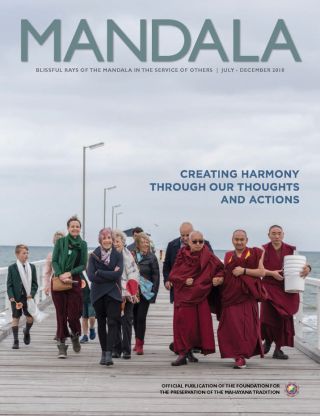
Lama Zopa Rinpoche with Buddha House students after blessing all of the sentient beings in the ocean, Adelaide, South Australia, May 2018. Photo by Ven. Lobsang Sherab.
The cover story, “Creating Harmony through Our Thoughts and Actions: FPMT Community Members Share Ideas on how to Create and Support Harmony,” opens up the conversation on how we cultivate an environment of peace and unity in our Dharma communities.
Contributors to this story include FPMT organization directors, spiritual program coordinators, Foundation Service Seminar facilitators, regional and national coordinators, and FPMT registered teachers.
We have made the print version of this cover story available for all to read online.
There were also a few submissions that we unfortunately were not able to fit into the print magazine that are available online as well.
In addition to the cover story, the latest print edition includes an interview with the 104th Ganden Tri Rinpoche Lobsang Tenzin; an excerpt from His Holiness the Dalai Lama’s The Life of My Teacher: A Biography of Kyabje Ling Rinpoche; and an interview with the new abbot of Sera Mey Monastery, Geshe Tashi Tsering, who served for twenty-four years as the resident teacher of Jamyang Buddhist Center.
The print version of the excerpt from His Holiness the Dalai Lama’s The Life of My Teacher: A Biography of Kyabje Ling Rinpoche is available for all to read online.
Finally, in this issue we also share the story about how an enormous Twenty-one Taras thangka brings blessings of peace to our chaotic world. Plus, teachings from Lama Yeshe and Lama Zopa Rinpoche.
Mandala magazine is published twice a year. If you would like to have future issues of Mandala sent to you in the mail, sign up for Friends of FPMT at the Foundation Friends level or higher. Friends of FPMT can also read the full issue online or download it to their electronic reading devices. They can also choose to donate their print issue to an incarcerated person, facilitated by the Liberation Prison Project.
We hope you enjoy the July-December 2018 issue of Mandala magazine.
- Tagged: friends of fpmt, mandala
13
Mandala January-June 2018 Out Now!
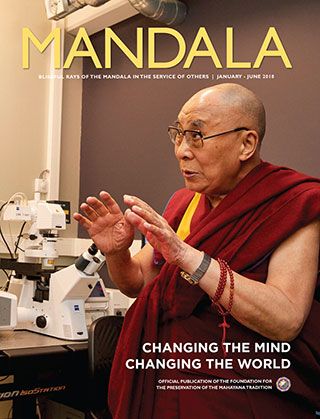
His Holiness the Dalai Lama talking with scientists during his visit to the Université de Strasbourg, France, September 2016. Photo by Olivier Adam.
In our just published Mandala January-June 2018, we explore what Buddhism offers the world in times of global difficulties to help pacify suffering and bring about peace.
As a preview to the print edition, we have made the cover story, “Changing the Mind, Changing the World: The Mind, Karma, and Global Change,” available to read online.
Also in this issue:
- His Holiness the Dalai Lama encourages Buddhists to share the wisdom and thinking of the Buddha and the Nalanda masters in secular ways;
- The Foundation for Developing Compassion and Wisdom offers snapshots of its activities around the world;
- Several FPMT centers, projects, and services share their approaches to being compassionate world citizens; and
- We take an in-depth look at the Inner Job Description, a mindfulness practice tool designed to help those offering service or working in any job transform their efforts into profound, powerful Dharma practice.
Plus, teachings from Lama Yeshe, Lama Zopa Rinpoche, new photos, interviews, and much more!
Find all our exclusive online stories for Mandala January-June 2018 and information on how to receive a print copy here:
https://fpmt.org/mandala/archives/mandala-for-2018/january-june/
Mandala is offered as a benefit to supporters of the Friends of FPMT program, which provides funding for the educational, charitable and online work of FPMT. The new issue is also available through the FPMT Foundation Store.
- Tagged: mandala
21
Ven. Thubten Chodron Discusses ‘Approaching the Buddhist Path’
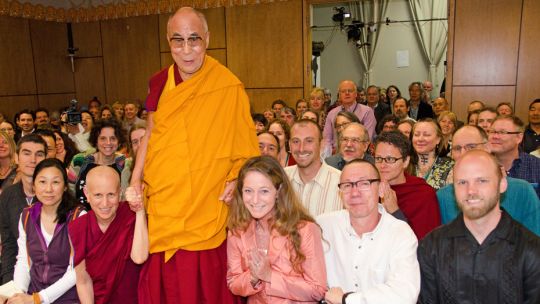
His Holiness the Dalai Lama with Ven. Thubten Chodron and students at Maitripa College, May 2013. Photo by Marc Sakamoto.
In August 2017, Wisdom Publications published Approaching the Buddhist Path, the first volume of a new collaborative series—The Library of Wisdom and Compassion—between His Holiness the Dalai Lama and American Buddhist teacher, scholar, and author Ven. Thubten Chodron. Former Mandala associate editor Donna Lynn Brown spoke with Ven. Chodron in June 2017 about His Holiness’s intentions to present the lamrim to a modern audience. Ven. Chodron explains one of the challenges the projects addresses:
“… [A] challenge non-Tibetans have with the lamrim is that—as His Holiness explains—it was written for people who are already Buddhists. Lamrim texts don’t talk about why rebirth makes sense; they assume you already believe this. And the guru is Buddha? People say, ‘I just came to learn to meditate! What’s that all about?’ So in this new series we are re-ordering some topics and approaching some of them in a different way. Regarding, for example, how to relate to a spiritual mentor, His Holiness explains that in depth for a modern audience. If people start out reading Pabongka Rinpoche’s Liberation in the Palm of Your Hand, they don’t know that he was teaching Tibetans who were about to take highest yoga tantra initiations. That’s not who walks into Dharma centers! People need preparatory material. In the West, what does His Holiness usually teach? Love, compassion, and secular ethics for everyone. For Westerners who are interested in the Buddha’s teachings, he starts out with the Buddhist worldview: the nature of the mind, the two truths—conventional and ultimate—the four noble truths, and the possibility of being free from the afflictions.
“Understanding these topics, people will then understand something about the basis, path, and result and will see how the lamrim meditations fit in. This project takes on the task of explaining the whole path, in some depth, to people who have a modern education. This series is not limited to Westerners. His Holiness says it’s also for young Tibetans as well as Chinese, Vietnamese, and other Asian students. …”
Read “Presenting the Path to Modern Students: An Interview with Ven. Thubten Chodron,” Mandala‘s newest online feature:
https://fpmt.org/mandala/in-depth-stories/presenting-the-path-to-modern-students-an-interview-with-ven-thubten-chodron
- Tagged: approaching the buddhist path, donna lynn brown, his holiness the dalai lama, ven. thubten chodron
8
A group of students from Tara Institute in Victoria, Australia, took the initiative to commence study of the Yamantaka sadhana. A small but devoted number of people soon developed a regular practice, culminating in the decision to undertake retreat this past June.
The result of the group’s practice combined the energy of three centers, each bringing a component part of support to the retreat. A member of the study group, Cynthia Karena, shared some of her reflections on the process in Mandala‘s latest online feature story “Community and Commitment: A Yamantaka Study Group at Tara Institute in Australia”:
… “The study group is good to become familiar with the meditations. Having them read out so you can actually meditate on them allows you to start memorizing them. Then when you do them yourself, you meditate more than just read the words.”
The meditations are outlined in the short sadhana practice, so people know where and how they fit in, said Tara Institute student Jill Lancashire.
“It’s good to introduce the short sadhana to people who were newly initiated and either had no previous experience with the format of a sadhana or for whom Yamantaka was a new practice.
“The definite thing is that having a schedule and a dedicated group of co-practitioners makes it much easier to do the practices properly and keep them going.” …
Read Cynthia Karena’s new article “Community and Commitment: A Yamantaka Study Group at Tara Institute in Australia” in its entirety:
https://fpmt.org/mandala/in-depth-stories/community-and-commitment-a-yamantaka-study-group-at-tara-institute-in-australia/
23
New Mandala Ebook: ‘Creating the Sacred’
This new ebook contains fourteen articles, interviews, and stories—published by Mandala between 1982 and 2017—that explore the meaning of the sacred art found at FPMT centers and how it was created. Plus, the collection contains a teaching by Lama Zopa Rinpoche on the benefits of holy objects. While all these pieces have been previously published, many, never digitized, have until now existed only in long-forgotten print editions.
Creating the Sacred is available as a benefit to Friends of FPMT at the e-Friends level and higher and to Mandala magazine’s center packages subscribers. In becoming a Friend, you support the FPMT International Office and its wide-ranging Dharma activities.
The ebook can also be purchased through the FPMT Foundation Store, Amazon’s Kindle store, and will soon be available through Apple’s iBooks, Barnes and Noble, Kobo, Aldiko, Overdrive, and other ebook outlets.
Friend of FPMT supporters join others from around the world to contribute to the success of all of FPMT International Office’s work in advancing education, charitable projects, online resources, services to FPMT communities, and more. Mandala ebooks are one of the many benefits of joining the Friends of FPMT program.
Find Creating the Sacred in the FPMT Foundation Store:
https://shop.fpmt.org/Creating-the-Sacred-eBook_p_2961.html
- Tagged: ebooks, holy objects, interview, mandala
19
“Finishing the whole study program [at Sera Je Monastic University] gives an opportunity to rejoice,” Geshe Tenzin Namdak told Ven. Gyalten Lekden in the just published interview “‘Something to Rejoice In’: Geshe Tenzin Namdak In His Own Words.” In the interview Geshe Namdak, who grew up in the Netherlands, talks about meeting the Dharma, studying twenty years at Sera Je in India, helping develop Choe Khor Sum Ling, the FPMT center in Bangalore, and other topics. In his characteristically humble way, he explained, “I didn’t do much, but at least there was some Dharma activity involved for the last twenty years, so that is something to rejoice in, and that makes the mind happy.”
Geshe Namdak was formally awarded his geshe degree during a three-day ceremony in May 2017, becoming the first Westerner to complete the full course of studies there and also to sit for the final geshe examination. Towards the end of the interview, Ven. Lekden asked Geshe Namdak, “Other than the actual Buddhist philosophy, what have you learned the most over the last twenty years here at Sera?”
“I don’t know. I mean, to develop the mind takes a long time, right? It’s the same with learning a language, it takes a long time. And you don’t really notice if you progress or not because it is a very slow process,” Geshe Namdak replied. “I have learned a lot from the Tibetans: to be more relaxed, to do things in a relaxed manner. Some of the monks are very relaxed, but at the same time they work very hard. Keep the mind in that relaxed state—that’s what the gurus show us all of the time. I learned quite a bit from the Tibetans to be serious, to work as hard as you can—but keep a kind of relaxed state of mind. Sometimes that’s not always easy, though!
Read the entire interview, “‘Something to Rejoice In’: Geshe Tenzin Namdak In His Own Words”:
https://fpmt.org/mandala/in-depth-stories/something-to-rejoice-in-geshe-tenzin-namdak-in-his-own-words/
FPMT.org and Mandala Publications brings you news of Lama Zopa Rinpoche and of activities, teachings and events from over 160 FPMT centers, projects and services around the globe. If you like what you read, consider becoming a Friend of FPMT, which supports our work.
28
Mandala Online: Buddhist Conduct in the Modern World
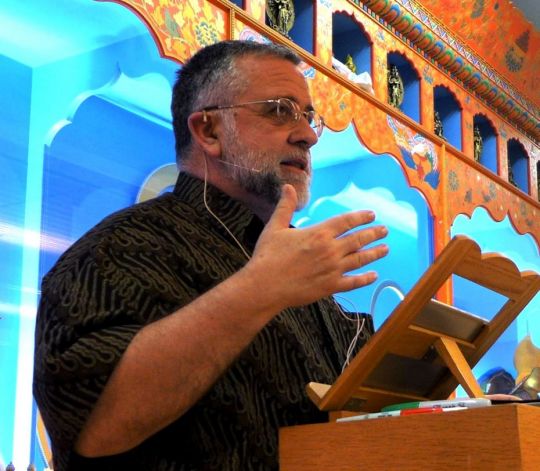
Dr. José Cabezón giving a talk at Maitripa College, Portland, OR, US, September, 2016. Photo by Laura Miller.
This month’s Mandala online feature discusses an important new book: The Just King: The Tibetan Buddhist Classic on Leading an Ethical Life, recently published by Snow Lion/Shambhala.
The book presents a lengthy work on ethics by Tibetan luminary Jamgön Mipham (1846-1912) translated by distinguished scholar-practitioner and former Sera Je monk Dr. José Cabezón.
Mipham’s text is one of the most comprehensive works on Buddhist ethics ever written, and deals with ethical self-cultivation, interpersonal behavior, social justice, criminal justice, government, management, taxation, the environment, and many other topics. Although Mipham was a Nyingmapa, his text is a summary of Indian sources foundational for the Gelug and other Tibetan schools. It draws on several sutras, including the Sutra of Golden Light, a favorite of Lama Zopa Rinpoche, to which Mipham devotes an entire chapter; and several Indian ethics and advice texts, including Precious Garland, Letter to a Friend, and The Staff of Wisdom by Nagarjuna. Mipham synthesized these works with the popular “mi-chö,” or “folk” teachings of Tibet concerning proper or beneficial conduct. Thus, his book is quintessentially Tibetan Buddhist, drawing on both canonical Indian Buddhist sources and traditional Tibetan wisdom.
In the Mandala online article, The Just King is reviewed in the context of some reflections on the teaching of Buddhist ethics from FPMT-registered teacher Don Handrick.
Read the full article here:
fpmt.org/mandala/in-depth-stories/buddhist-conduct-a-new-resource-from-old-tibet
Go to the FPMT Online Learning Center’s Discovering Buddhism course to learn more about the ten non-virtues, karma, and other topics related to this article as taught by Lama Zopa Rinpoche and FPMT-registered teachers.
Mandala is offered as a benefit to supporters of the Friends of FPMT program, which provides funding for the educational, charitable, and online work of FPMT.
- Tagged: don handrick, ethics, jose cabezon, mipham, the just king
30
Mandala July-December 2017 Out Now!
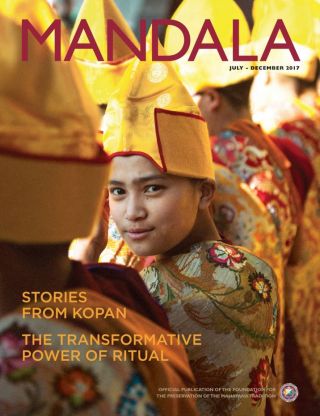
COVER: Kopan nuns in ritual dress awaiting Jangtse Chöje Lobsang Tenzin Rinpoche on the final day of the Monlam prayer festival, Kopan Monastery, Nepal, March 2017. Photo by Matt Lindén.
Mandala July-December 2017 is in the mail!
In the issue we share news from Kopan Monastery—where the seed of FPMT first sprouted—including a story on the enthronement of Thubten Rigsel Rinpoche, the reincarnation of Kopan Monastery’s former abbot, the beloved Khensur Rinpoche Lama Lhundrup Rigsel; a report on the two Kopan nuns receiving their geshema degrees; and a look at the state of Buddhism in the Himalayas. We also explore the transformative power of ritual with a collection of pieces: a teaching on the benefits of ritual by Lama Lhundrup, an interview with scholar José Cabezón, and personal stories from five Western monks studying at Sera Je in India. Plus, teachings from Lama Yeshe, Lama Zopa Rinpoches, new photos, interviews and much more!
While you wait for your copy, Mandala is highlighting several online pieces for you to enjoy now, including:
- Freda Bedi’s ‘Big’ Life: An Interview with Vicki Mackenzie, a Mandala online feature
- Photo album from the enthronement of Thubten Rigsel Rinpoche
- Read Mandala‘s extensive archive coverage of the passing of Khensur Rinpoche Lama Lhundrup Rigsel
Enjoy Mandala July-December 2017 online content today:
https://fpmt.org/mandala/archives/mandala-for-2017/july/
Mandala is offered as a benefit to supporters of the Friends of FPMT program, which provides funding for the educational, charitable and online work of FPMT. The new issue is also available through the FPMT Foundation Store.
25
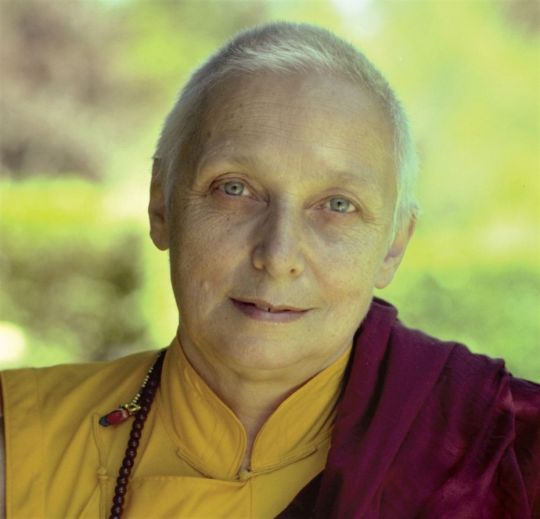
Freda Bedi as a nun. Photo by John Hills courtesy of Shambhala Publications.
Writer Vicki Mackenzie recently talked with Mandala about her new book The Revolutionary Life of Freda Bedi: British Feminist, Indian Nationalist, Buddhist Nun [available through the Foundation Store]. Mackenzie has been a student of Lama Yeshe and Lama Zopa Rinpoche since 1976 and is also the author of Reincarnation: The Boy Lama and Cave in the Snow.

Photo courtesy of Shambhala Publications.
In the interview Mackenzie discussed Freda Bedi’s role in helping the Tibetan refugees who began arriving in India in 1959, including the young Lama Zopa Rinpoche. Bedi, born in 1911 in England, played a significant role in providing support to some of the first Tibetan lamas to teach Westerners, primarily through the Young Lamas Home School, which she established in 1960. Lama Zopa Rinpoche was one of the many young tulkus who attended the school, and Bedi assisted him to obtain medical care and sponsorship.
Rinpoche often speaks of how Freda Bedi helped him, and she also helped many others. She worked tremendously hard to raise money for the refugee communities, helped Chögyam Trungpa Rinpoche get a scholarship to Oxford, organized European and American tours for His Holiness the Sixteenth Karmapa, and played many other roles.
Bedi, who strongly believed in the equality of women, also established the first Tibetan nunnery in the exile community. Because of her efforts, Tibetan nuns in exile got their first nunnery, Karma Drubgyu Thargay Ling, before the monks got their first monastery. Later, the Karmapa encouraged her to ordain, and she became the first gelongma in the Tibetan tradition. She developed into a serious practitioner, a translator, and a teacher of the Dharma.
As Vicki Mackenzie says, Freda Bedi “is an icon in the transmission of Buddhism to the West, an icon. And yet, she has remained fairly unknown. … Her story deserves to be told.”
Read the full interview here:
https://fpmt.org/mandala/in-depth-stories/freda-bedis-big-life-an-interview-with-vicki-mackenzie/
Purchase The Revolutionary Life of Freda Bedi through the Foundation Store:
https://shop.fpmt.org/The-Revolutionary-Life-of-Freda-Bedi_p_2925.html
Mandala is offered as a benefit to supporters of the Friends of FPMT program, which provides funding for the educational, charitable and online work of FPMT.
- Tagged: freda bedi, india, lama zopa rinpoche, vicki mackenzie, young lamas
13
Mandala Online: The Benefits of Monasteries and Nunneries
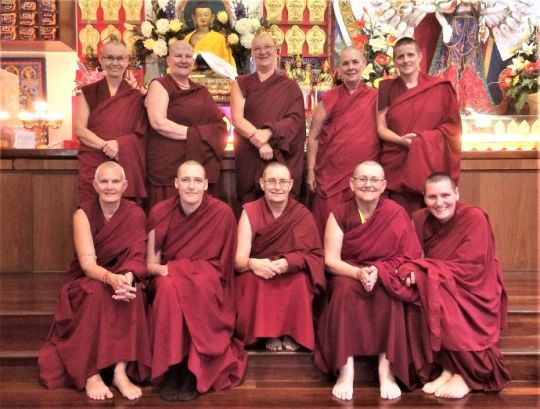
Nuns of Chenrezig Institute. Back row from left: Vens. Lozang Tsondru, Thubten Damcho, Lozang Tseten, Lozang Rigsal and Lozang Wangmo. Front row from left: Vens. Lozang Tsultrim, Gyalten Tsultrim, Tenzin Palyon, Thubten Tongnyi and Thubten Pema. Chenrezig Institute Gompa, Australia, November 2016.
Are monasteries and nunneries necessary? What are their benefits? Mandala explores this issue in a new online feature called “The Benefits of Monasteries and Nunneries,” which presents recent words of wisdom from Lama Zopa Rinpoche along with reflections by American monk Ven. Tenzin Legtsok.
To the question of whether monasteries and nunneries are needed, Rinpoche answers “Yes!” He explains that monastic communities are vital for three reasons: first, they are places where holy objects are found that allow those who visit or provide support to purify their minds, collect merit, and gain realizations; second, they offer a place for monks and nuns to live in their vows away from distractions; and third, they play an important role in preserving the Dharma.
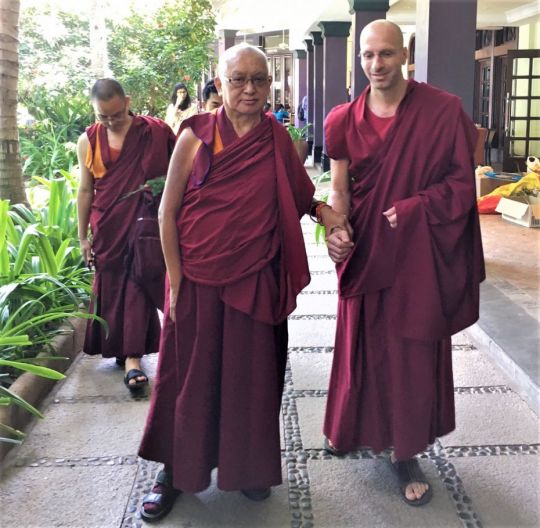
Lama Zopa Rinpoche and Ven. Tenzin Legtsok, Bangalore, India, December 2016. Photo by Ven. Holly Ansett.
Ven. Legtsok, who is in the geshe studies program at Sera Je Monastic University, complements Rinpoche’s words with a discussion of the reasons why ordained people need to live together in “brick-and-mortar” communities.
Find out the details by reading the latest online feature from Mandala!
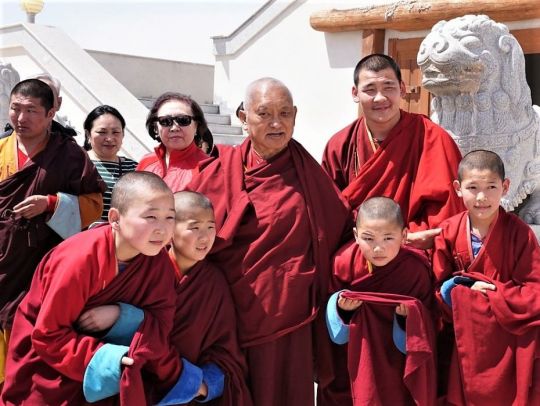
Lama Zopa Rinpoche with the young monks of Khamar Monastery, Mongolia, May 2017. Photo by Ven. Lobsang Sherab.
Read “The Benefits of Monasteries and Nunneries,” Mandala‘s newest online feature:
https://fpmt.org/mandala/in-depth-stories/the-benefits-of-monasteries-and-nunneries/
Mandala is offered as a benefit to supporters of the Friends of FPMT program, which provides funding for the educational, charitable, and online work of FPMT.
25
Mandala Online: Pilgrimage to Vikramashila
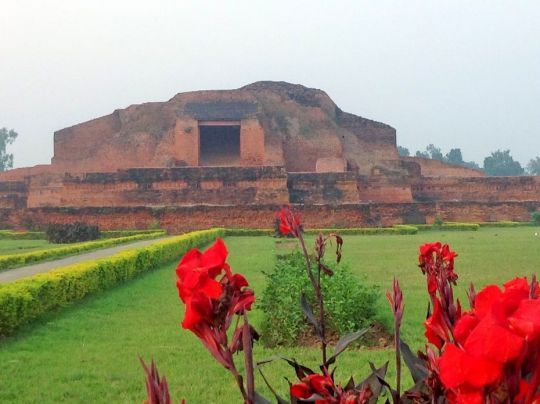
The main stupa of Vikramashila monastic university, destroyed approximately 1200 C.E. India, October 2016. Photo by Annie McGhee.
“Pilgrimage needs faith. The more faith, the more happiness. Otherwise, you are just like a tourist looking at ruins. … When you go to these holy places it reminds you of impermanence. Once these places were great cities but now there are just stones. A thousand years ago these places were quite different. But even though there are just stones now these stones are so precious.”—Lama Zopa Rinpoche
In October 2016, Ladakhi Lama, a former attendant of the great Khunu Lama Rinpoche, led a few people from Root Institute in Bodhgaya, India, on a pilgrimage. The group traveled to the ruins of Vikramashila, a one-time monastic university where Lama Atisha lived and taught. For centuries, Vikramashila and Nalanda were the two most important centers of Buddhist learning in India.
In this month’s Mandala online feature, Australian Annie McGhee reports on the pilgrimage to Vikramashila. Read about her experiences, see pictures of the famous site—and perhaps decide whether you too should take a jeep ride across India’s Bihar State to take in the blessings of the precious stones and statues of Atisha’s home monastery!
Read “In the Footsteps of Atisha: A Pilgrimage to Vikramashila,” Mandala‘s newest online feature:
https://fpmt.org/mandala/in-depth-stories/in-the-footsteps-of-atisha-a-pilgrimage-to-vikramashila/
For those who are inspired, Root Institute is planning a meditative pilgrimage to Vikramashila for December 16-19, 2017. For information, please visit www.rootinstitute.ngo.
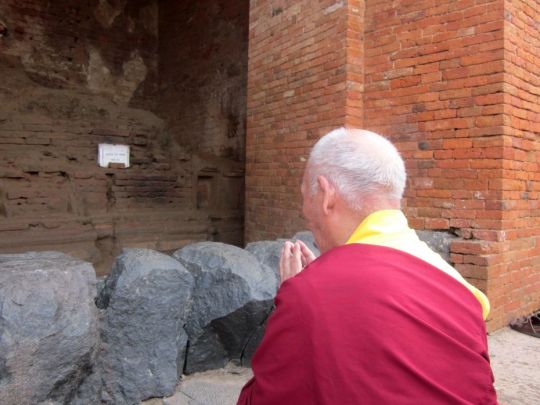
Ladakhi Lama makes a prayer at Vikramashila, India, October 2016. Photo by Inder Kaant.
Lama Atisha’s Lamp for the Path to Enlightenment is the subject of Lama Zopa Rinpoche’s Light of the Path teaching retreat series, hosted by Kadampa Center in North Carolina, US. Light of the Path 2017 is scheduled for August 20-September 17, 2017.
Mandala is offered as a benefit to supporters of the Friends of FPMT program, which provides funding for the educational, charitable, and online work of FPMT.
- Tagged: lama atisha, pilgrimage, vikramashila
7
New Mandala Ebook: ‘From Warm Heart to Warm Heart’
The ebook contains seventeen interviews about the transmission of Dharma, published by Mandala between 1982 and 2017. While all have been previously published, many, never digitized, have until now existed only in long-forgotten print editions.
Included are interviews with Lama Yeshe, Geshe Lhundub Sopa, and Yangsi Rinpoche as well as with distinguished scholars, practitioners, and teachers like Ven. Thubten Chodron, Ven. Antonio Satta, Jeffrey Hopkins, Thupten Jinpa, Georges Dreyfus, Robert Thurman, Anne Klein, John Dunne, and Roger Jackson. As a group, these thinkers provide fascinating insights into the diverse challenges of transmitting the Dharma from its traditional Tibetan setting into the modern world.
The ebook is downloadable in three formats—MOBI for Amazon’s Kindle devices, EPUB for other e-readers, iPads and tablets, and as a PDF—so that you can read it on all of your electronic devices, including your laptop or desktop computer.
The ebook is available as benefit to Friends of FPMT at the e-Friends level and higher and to Mandala magazine’s center packages subscribers. In becoming a Friend, you support the FPMT International Office and its wide-ranging Dharma activities. The ebook can also be purchased through the FPMT Foundation Store, Amazon’s Kindle store, and will soon be available through Apple’s iBooks, Barnes and Noble, Kobo, Aldiko, Overdrive, and other ebook outlets.
Friend of FPMT supporters join others from around the world to contribute to the success of all of FPMT International Office’s work in advancing education, charitable projects, online resources, services to FPMT communities, and more. Mandala ebooks are one of the many benefits of joining the Friends of FPMT program.
- Tagged: dharma in the modern world, ebooks, interview, mandala
- Home
- News/Media
- Study & Practice
- About FPMT Education Services
- Latest News
- Programs
- New to Buddhism?
- Buddhist Mind Science: Activating Your Potential
- Heart Advice for Death and Dying
- Discovering Buddhism
- Living in the Path
- Exploring Buddhism
- FPMT Basic Program
- FPMT Masters Program
- FPMT In-Depth Meditation Training
- Maitripa College
- Lotsawa Rinchen Zangpo Translator Program
- Universal Education for Compassion & Wisdom
- Online Learning Center
- Prayers & Practice Materials
- Overview of Prayers & Practices
- Full Catalogue of Prayers & Practice Materials
- Explore Popular Topics
- Benefiting Animals
- Chenrezig Resources
- Death & Dying Resources
- Lama Chopa (Guru Puja)
- Lama Zopa Rinpoche: Compendium of Precious Instructions
- Lama Zopa Rinpoche: Life Practice Advice
- Lama Zopa Rinpoche Practice Series
- Lamrim Resources
- Mantras
- Prayer Book Updates
- Purification Practices
- Sutras
- Thought Transformation (Lojong)
- Audio Materials
- Dharma Dates – Tibetan Calendar
- Translation Services
- Publishing Services
- Teachings and Advice
- Find Teachings and Advice
- Lama Zopa Rinpoche Advice Page
- Lama Zopa Rinpoche: Compendium of Precious Instructions
- Lama Zopa Rinpoche Video Teachings
- ༧སྐྱབས་རྗེ་བཟོད་པ་རིན་པོ་ཆེ་མཆོག་ནས་སྩལ་བའི་བཀའ་སློབ་བརྙན་འཕྲིན།
- Podcasts
- Lama Yeshe Wisdom Archive
- Buddhism FAQ
- Dharma for Young People
- Resources on Holy Objects
- Ways to Offer Support
- Centers
- Teachers
- Projects
- Charitable Projects
- Make a Donation
- Applying for Grants
- News about Projects
- Other Projects within FPMT
- Support International Office
- Projects Photo Galleries
- Give Where Most Needed
- FPMT
- Shop
Subscribe to FPMT News
Translate*
*powered by Google TranslateTranslation of pages on fpmt.org is performed by Google Translate, a third party service which FPMT has no control over. The service provides automated computer translations that are only an approximation of the websites' original content. The translations should not be considered exact and only used as a rough guide.Try to eliminate the negative attitudes, which bring suffering, and increase the positive attitudes, which bring happiness.







